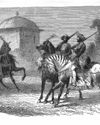Poetic Faith

THERE is a lone tree. A few floating clouds. A serpentine road and then the house is revealed. The house is a spectacle that is both mute and articulate. A kitchen, a courtyard, windows, rooms, and the entrance. The screen is a landscape of desire, of nostalgia, and of loss. It is a portal.
A single ray of sunshine, that breaks through the old window bars and falls on the floor in the frame, is enough to take me where I have not been in years, to make me see that house again, to feel the loss, to be in that house once more.
Cinema has that power. To take us where we haven’t been, the promise of a house. In watching a film, we gaze at a space we can never occupy but can live in or have lived in. In Achal Mishra’s Gamak Ghar, which was released in 2019, the house is the protagonist. The house hasn’t been scanned and it is here that we experience the tenuousness of property relations and through it, the story of migration, of aspiration, and of loss.
The film is set in Mishra’s ancestral village, Madhopur, in Darbhanga and is about the house that his grandfather built in the 1950s. A structure becomes home with presence and this real, lived-in space was where fiction intersected with the real and then, with my own story.
It is real and, in its realness, it contains a thousand other such homes. Like memory, which can’t be created. It is both real and surreal. The house inspires, it acts and it disintegrates. I wonder if the house would be the same if it were made up of footage and insertions. Would I then enter it the way I did?
Bu hikaye Outlook dergisinin January 01, 2024 sayısından alınmıştır.
Start your 7-day Magzter GOLD free trial to access thousands of curated premium stories, and 9,000+ magazines and newspapers.
Already a subscriber ? Giriş Yap
Bu hikaye Outlook dergisinin January 01, 2024 sayısından alınmıştır.
Start your 7-day Magzter GOLD free trial to access thousands of curated premium stories, and 9,000+ magazines and newspapers.
Already a subscriber? Giriş Yap

Star Wars
With old alliances fracturing and new ones being forged, the global order is not just shifting—it is being rewritten in real time

All the President's Men
Is the US reset with Russia due to the China factor?

Interminable Chaos
Is the ongoing global geopolitical security crisis ephemeral or a continuum?

Enter, a New Perilous Era
How long will it take us to understand a profoundly transformed global order?

Where is My School?
Has the Beti Bachao Beti Padhao (BBBP) scheme met its target to push for girls' education a decade after it was launched?

Shivaji's Rabindra Sangeet
How does Bengali literature perceive Maratha heroism, especially in an age of religious polarisation?

Mother Russia
Just a couple of days before we landed at the Sheremetyevo Airport in Moscow, there had been a major drone attack by Ukraine in the Russian capital.

Endangered Globe
It is time for a definitive political and societal policy reset

ReOrient
China's ultimate aim is to replace the US and become the pre-eminent power in the world

Exchange Rate
Intentions, strategy and the global impact of US-driven tariff wars
